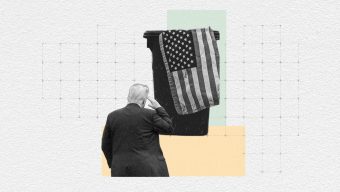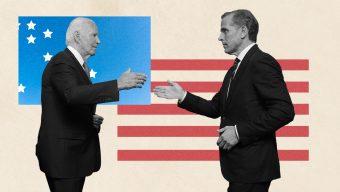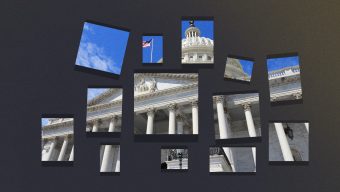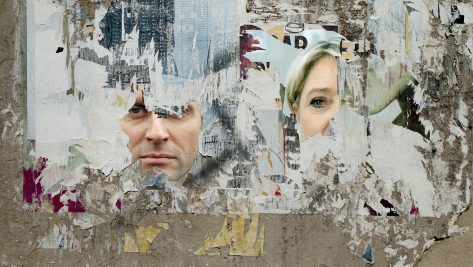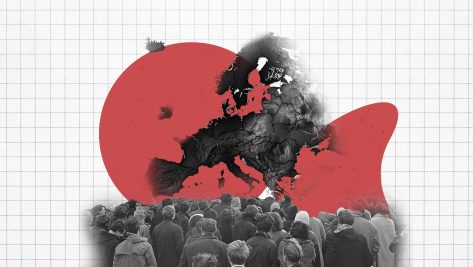In Conversation: Multilateralism
The multilateral global order has suffered extreme shocks in recent years, but can it survive? Cristina Manzano sits down with Ángel Alonso to discuss the relationship between Europe and Latin America, strategic autonomy, and global governance.
Transcription
Cristina Manzano: Thank you for agreeing to have this conversation about where we are in the world at a turbulent time with uncertainties all around us. We just have come out of a pandemic, we’re in the middle of a war in Europe. The major powers are not talking to each other and I think it’s important to provide some context and some ideas of where we’re going. Let’s start with something that’s just around the corner.
CM: In July of this year Spain assumes the Presidency of the Council of the European Union, and one of the priorities that has been put on the table is to strengthen and revitalize the relationship with Latin America which, for Spain, has always been a priority, but for the European Union has been a secondary issue. What do you think we can expect from this new relationship, from this summit that is going to take place very early on in the Presidency between the EU and CELAC, which is the multilateral institution that is currently encouraging these broader relationships.
Ángel Alonso: I think it’s worth being optimistic. And I think it’s important for Spain, which is assuming the Presidency, as you said, to take this opportunity to put Latin America back on the map as a priority of European foreign policy. This is something that over the last few years, as you rightly said Cristina, has lost importance. It hasn’t been 25 a priority for the European Union because of geopolitical trends. The center of gravity has shifted towards other regions.
AA: And I think it is important for the Spanish Presidency to showcase the role of Latin America, because it is also a region not only of opportunity, which it always has been, but it is also an ally for Europe, at a particularly turbulent time at international level, in which the countries of Latin America have a constructive outlook, or they can offer a constructive outlook, and they can be allies, precisely in redrawing a more effective multilateral arena, to respond to the problems of our time.
AA: But as you were saying, it seems that Spain has put or is going to put the relationship with the with Latin America at the core of this Presidency, with the European Union-CELAC Summit in July, but then also with a whole host of meetings and summits at different levels, with finance ministers, foreign ministers and, I think that, as we were saying, it’s a very good opportunity to restore the strength of this bond, which is fundamental.
CM: On what basis do you think that this relationship can be relaunched? Because we often talk about mutual respect, here we are talking about ending Europe’s sense of superiority. And yet, what we’ve heard, for example, lately, is that Europe wants to take up this relationship again because we need the raw materials, as we are having energy supply problems and Latin America has some of the key minerals we need for our digital and green transitions. And in the end, we are repeating the same pattern of pure extractivism and pure interest in obtaining raw materials, a low value-added economy that benefits us, but perhaps does not benefit them so much.
AA: You said it perfectly, the foundations have to be different. Latin America cannot have the feeling that Europe’s main interest is purely extractive or purely economic. I think that the foundations of this relationship must be based on respect as equals. And that’s something that this relationship has traditionally suffered from, because, on many occasions, the perception of Europe in the rest of the world is that we go into these relationships with a sense of superiority.
AA: It’s not unique to Europe. It also happens to the United States and other major powers, and I believe that with Latin America we need to move on from this, and we have to build a relationship of mutual respect and mutual learning, in which Latin America obviously still has a long way to go on the way to development and on which it can learn a lot from the European experience, in terms of integration, for example. At the same time, I think there are great examples in Latin America that can be very useful for Europe, which we can learn from as well.
AA: Another thing that is emerging in some Latin American countries is their desire not to take sides in this increasingly divided global order. We were used to the blocs of the United States and China, but now with the war in Ukraine, there’s another divide between those who support Ukraine and those who do not. And there has been quite a lot of ambiguity in some Latin American countries. Mexico always boasts about its non-intervention policy, but so does Brazil. Even Lula’s Brazil, has proclaimed, is proclaiming this ambiguity. How do you see that role of Latin America? By the way, we’re talking about Latin America as a bloc, but it is not a bloc.
AA: This is very complex. Latin America is several Latin Americas and indeed, some of the mistakes we often make is to lump this complexity together. I think that there are many points on which we coincide with Latin America in the current context. For example, you mentioned the case of Ukraine. I don’t think that the complexity of the situation in Ukraine has been clearly explained and that I believe that, for example, the principle of sovereignty, which is the principle of the Russian invasion of Ukraine, is completely undermined by this attack.
AA: This is the invasion of a fully independent, sovereign country because of a desire for expansion which sounds like an extremely imperialist argument I think that if this is well explained and if it is communicated properly, it will resonate well in Latin America. If we appeal to this principle to understand the crisis in Ukraine and we explain the context of the situation in Ukraine, based on basic respect for sovereignty, international security and the basic rules of international law, I think that this will generate common ground.
AA: Another aspect that I would like to mention Cristina, is what you mentioned before, the window of opportunity. Yes, I think that also because of the political cycle that we have experienced in Latin America, now we are also seeing or we are living in a situation in which this polarization between right and left, between a more conservative and a more progressive bloc, between what we understand traditionally as the Chavista or Bolivarian axis, I think that this is also going to be less important over the next few years. It’s true that we have a number of progressive or more left-wing governments, but it is a very different left from the one that we had in Latin America ten or 20 years ago.
AA: I believe that it is a more positive, more realistic one, but in the good sense of the word, more open to dialogue. And above all, I think it is a left that respects the institutional framework, which is something that perhaps hasn’t always been the case in the past. So, those are points in common that I think resonate very well on both sides of the Atlantic.
CM: Let me go back to Europe. Another of the priorities, another of the points that Spain has shown interest in during its Presidency is to reinforce and move forward in is what is known as strategic autonomy. Plus, we have recently added the adjective “open”. We don’t want to be a fortress in Europe, but we want to have a sufficient degree of independence that safeguards us or means we can protect ourselves against external shocks.
CM: The clearest case seemed to be defense. with the very complicated situation of NATO before the war in Ukraine and its resurgence after the Russian invasion. But we saw it with the pandemic too, with issues related to healthcare. And we’re seeing the same thing, of course, with energy. The need to change our energy model. What is your opinion of strategic autonomy? Are we on the right track? Is there any chance of it actually happening? Where do you think we are?
AA: I am actually quite critical. That said, I think that this open strategic autonomy and this approach of the European Union in this sense, responds to the times we are living in. It must be understood and interpreted in the light of the current context. And as you were saying, we have just gone through a double crisis or double shock. First with COVID, which highlighted that overdependence on basic goods, masks, medicines, which called into question that having excessively open economies dependent on global value chains, and when these global value chains go through a period of crisis, they are totally crippled or they are totally disrupted.
AA: That dependence becomes evident and obviously we suffer. It’s the same now. Obviously, with the crisis in Ukraine and the energy dependence, on a key supplier, which was Russia. So, this progression is natural and, in fact, it had already happened in some shape or form before this crisis, which has only deepened this slide. However, before we were talking about respect, we were talking about common sense, and I think maybe Europe is too intent on playing the role of a major power, in a context that is much more geopolitical, in which we have seen the return to power politics of the major powers, in which Europe, as a single actor which it is in part but not totally, is trying to tinker with the traditional rules of the game of the great powers and power politics.
AA: I think this is a mistake to a certain extent. I mean, I think that Europe has traditionally been an example of how to overcome power politics in which a number of countries that until recently were at war decide to sacrifice part of their national sovereignty in pursuit of a common good and recognize that if we pursue greater integration we have a better chance to move forward and be better. No, I’m not questioning or criticizing the language of open strategic autonomy, but that it shouldn’t lose, its purpose and value that I think that Europe has been pitching for decades with the European project to the international community. And unfortunately I think we lose a bit of that value every time we use that traditional language of the major powers.
AA: I think that Europe has traditionally been a role model for a project that transcends that Westphalia system and we must not lose this, because I think that the world must somehow move in that direction in the long term, because of the interdependence we have.
CM: However, this is paradoxical, because you are talking about Europe, which has stated through the mouthpiece of its high representative that it wants to play that power game. On the one hand, we are talking about the debates, about the increases in military budgets as a result of the war. We have strengthened our faith in NATO as a defensive alliance.
CM: And yet, all this is not really leading us to become more self-sufficient, but to be more dependent on the United States. First, because the United States is the country that is also leading the way, as has traditionally been the case, in support of Ukraine, on the one hand, but, on the other, in our purchases of weapons, our support for Ukraine through weapons, which means that we have to renew our arms stockpiles, we are also becoming more dependent on the United States.
CM: So, on the one hand, there is all this rhetoric about whether we want to be more self-sufficient. On the other hand, reality seems to be pushing us in another direction.
AA: Yes, because of this global polarized world we live in. And obviously it would be naive to say that Europe can take an equidistant stance between China and the United States. There is a set of values in the Transatlantic community that tie us to the United States, starting with our democratic principles and values. So, it’s not about being equidistant, it is a matter of trying to play a more proactive and constructive role in the current highly polarized times we are living in.
AA: On the trade front, for example, where we can see friction and a divergence between Europe and the United States, based on respect between two traditional partners, I think that Europe obviously has to look out for the interests of its industry, of its companies, but you can’t play that zero-sum game that we often see if we get dragged into that rivalry and sometimes unfair competition, which often contravenes the laws of the of the World Trade Organization, I think we are shooting ourselves in the foot. So what values are we showcasing?
AA: I’ll give you another example, which I’m very critical of. In the field of energy, and here I think we have to be self-critical. We have been talking for a long time on the subject of the energy transition, to stop using fossil fuels, criticizing countries that were subsidizing the use of fossil fuels in the framework of the G-20, for example, in Indonesia. Now, we have a crisis. We have an overdependence, we eliminate that overdependence, and all of a sudden it’s okay to start mining coal again and burning it.
AA: This is what we’ve been arguing for a long time with the rest of the world, with Asia, with Africa, with Latin America. Now they are more than justified in saying to us, where are your principles and values? What you were saying was wrong until two minutes ago is now ok to do it again. So, I think that Europe has to be a role model of being consistent and I believe that this is where our capacity to showcase not hard power, but perhaps soft power, normative power lies and that has to do with greater cooperation at international level.
CM: You mentioned we are Europe. The European Union has traditionally been a trading and regulatory power and yet, another of the paradoxes that we are seeing in this reaction, both in the face of competition with China as well as the need to strengthen the fight against climate change, etc. In the United States, they are introducing protectionist measures that exclude third countries, measures that prevent exports, etcetera.
CM: It is true that this comes under the aegis of controlling technology, making sure that competitors do not advance at the same pace as the USA. But we end up going against our own principles.
AA: It is these double standards which damage our reputation on the international stage and damages Europe as a power in its own right, as a normative power. This is natural, of course. That’s also why on many occasions, going back to what we were talking about earlier, that global level narrative is being lost, Europe loses it and loses it by applying those double standards.
AA: In Europe, we have questioned the double standards of the United States many times. And now we realize that we are also falling into that trap. I want to make it clear that this is not about recognizing that sometimes you have an overdependence on global value chains that you have to correct, that you have to develop industries to be more self-reliant. I’m not questioning that. But for example, nearshoring is not the same as friendshoring, because then you’re defining friends and you’re defining blocs. And I think that if Europe falls into a policy of blocs we are doing a disservice to the international community.
CM: And it is true that it is not the same reconfiguring value chains in terms of geographical logic as in terms of ideological friendship, which is where we are heading.
AA: Friendships that we know can change from one day to the next.
CM: You were talking about global narratives. We’ve talked about Latin America, we’ve talked about Europe, you mentioned China and yet there are a number of multilateral institutions, starting with the United Nations and its entire system whose capacity to address all of these global issues is being called into question. Where are we? Where do you see us going in the international order?
AA: This is a very interesting time, a difficult, critical moment, but at the same time I’m sorry to use the word again but I think it’s a time of opportunity. A time to overhaul a system of global governance that has been questioned for several years. The system implanted of the United Nations, the Bretton Woods system, which centers on financial and economic governance, is a system that dates back to World War II, the end of World War II and of course, many decades have gone by since then.
AA: The world has changed, globalization has deepened, we are much more interdependent. We have challenges at global level such as climate change, which were not even on the radar 70 or 80 years ago. So, it is true that this governance has evolved, but it has developed by putting a band-aid on a patient who is bleeding to death. We have seen this in the COVID crisis, for example, with the limitations of the World Health Organization to respond to a pandemic, even though we knew it was on the cards.
AA: Or now the war in Ukraine, we see the limitations of the Security Council, which has a permanent member that has the right to veto, which is Russia and is the aggressor. So, I think that this crisis of multilateralism which worsened after the 2008 crisis, is when we saw the rise of the G20 as the main forum for economic and financial coordination at international level.
AA: So, they are adjustments that have been made, but I think that they need I don’t want to call it re-founding, although I would like to see a re-foundation of the international system, but that it basically shows the limitations between a global world, that is globalization 5.0 and governance 1.0, still based on a on a system of decision-making based on the Westphalia system of nation states in which there are already actors at transnational and planetary level that don’t have a voice who often have power, though this is not reflected at governance level. So, I would say that…
CM: Just like civil society, the numerous NGOs in civil society and even companies are essential players.
AA: Yes, yes. So, I think we are at a point in time when that system which has been questioned for a long time now and it is obvious that it has to be adjusted and reshaped, but there is still no clear idea of which direction we are going. The negative point, I would say, is that obviously we’re in a world which is much more geopolitical and much more based on power politics that we mentioned before and of course, less conducive to cooperation between countries that enabled us, for example, in the middle of the last decade to sign the Paris Treaty to combat climate change, to adopt the 2030 Agenda, which is now gone. It’s not the right time for making progress on this scale, not at international level. But there is no doubt that this reflection and the will to change is there.
CM: And, at the same time, in this last decade we have seen the rise of the other great power which is China, which is creating its own institutions and it would seem that they are trying to create a parallel or alternative order.
AA: But again, that’s an answer to the failure to adjust and reform that system. Look at the G20 summits at leader level since 2009 in their final resolutions, in their statements, the issue of the need to reform the voting in organizations such as the World Bank and the International Monetary Fund, recognized by countries such as the United States, European countries. In practical terms, no progress has been made in this regard, so, we need to understand that suddenly, countries like China, and China is just the tip of the iceberg, we also have Brazil, South Africa, India, which has the Presidency of the G20 this year, which are also claiming for greater influence in these institutions, because that post-war world that we mentioned does not reflect this.
AA: A country like India which today is the most populous country on the planet, having just overtaken China, does not have a seat on the United Nations Security Council, when it represents the most populous country on the planet. So, these are these adjustments that we can approach in one of two ways. One is to keep applying a band-aid while the patient continues to bleed to death or to come together once and for all as an international community to overcome those differences and that rivalry that we were talking about, and finally think what institutions we need at global level to tackle the challenges ahead, no longer as individual countries, but as humanity as a whole.
CM: And let me finish with the role of education in all this.
AA: Here, I am more optimistic. I think that the new generations, in one way or another, are also more global generations, through technology and connectivity. And I think they are more aware. we’ve seen this, for example, in the fight against climate change, we have seen the example of young people who said enough is enough. Our institutions, our governments are not providing any answers to this problem which is running the risk of destroying the planet on which, as a future generation, we want to live our lives.
AA: So, I think that education is fundamental. What we have to do is to explain this global citizenship better, teaching people that we can be citizens of Spain we can be Andalusians, we can be from Madrid, we can be from your town or we can be European. And we are very proud to be so. But above all that, we share the same planet, we share the same space and we have to work together. And I think I see that the new generations are more aware than maybe we were and that education systems are also focusing on this element or at least more than they were doing. Let’s also see how things pan out in this highly geopolitical, confrontational time we are living in. I hope that it doesn’t contaminate what I think is a relatively positive trend that still needs to be brought home through education in values for global citizenship.
AA: However, education is fundamental at all levels, including university level. For example, in international relations as an area of study and training, there has been a boom. And I think that also in these disciplines you have to factor in the idea of a global approach and of an international community.
CM: Well, it’s a wonderful note of hope, of the future, of youth to end this conversation. Thank you very much for sharing with us and with all the people who follow Insights your impressions and your knowledge.
AA: Thanks to you for the opportunity, it has been a pleasure.




